HI5015: Legal Framework Impacting PepsiCo's Australian Operations
VerifiedAdded on 2023/06/09
|10
|2728
|223
Report
AI Summary
This report provides a comprehensive overview of the legal aspects of PepsiCo's operations in Australia, fulfilling the requirements of the HI5015 assignment. It begins with an introduction to the regulatory environment faced by multinational enterprises, followed by a detailed description of PepsiCo, including its industry, number of employees, and global headquarters location. The report then delves into the specific regulatory framework affecting PepsiCo in Australia, including taxation, the Fair Trading Act, food safety regulations, employment law, and environmental regulations. Furthermore, it analyzes the impact of various treaties, agreements, and conventions, such as the Food Standards Australia and New Zealand Act 1991, the Fair Trade Agreement, the China and Australia Free Trade Agreement (ChAFTA), and the tax treaty between Australia and the United States, on PepsiCo's business. The report concludes by summarizing the key findings and implications of the legal and regulatory landscape for PepsiCo in Australia. This document is a valuable resource for students studying international business and law, offering insights into the challenges and opportunities faced by multinational corporations in a globalized world.
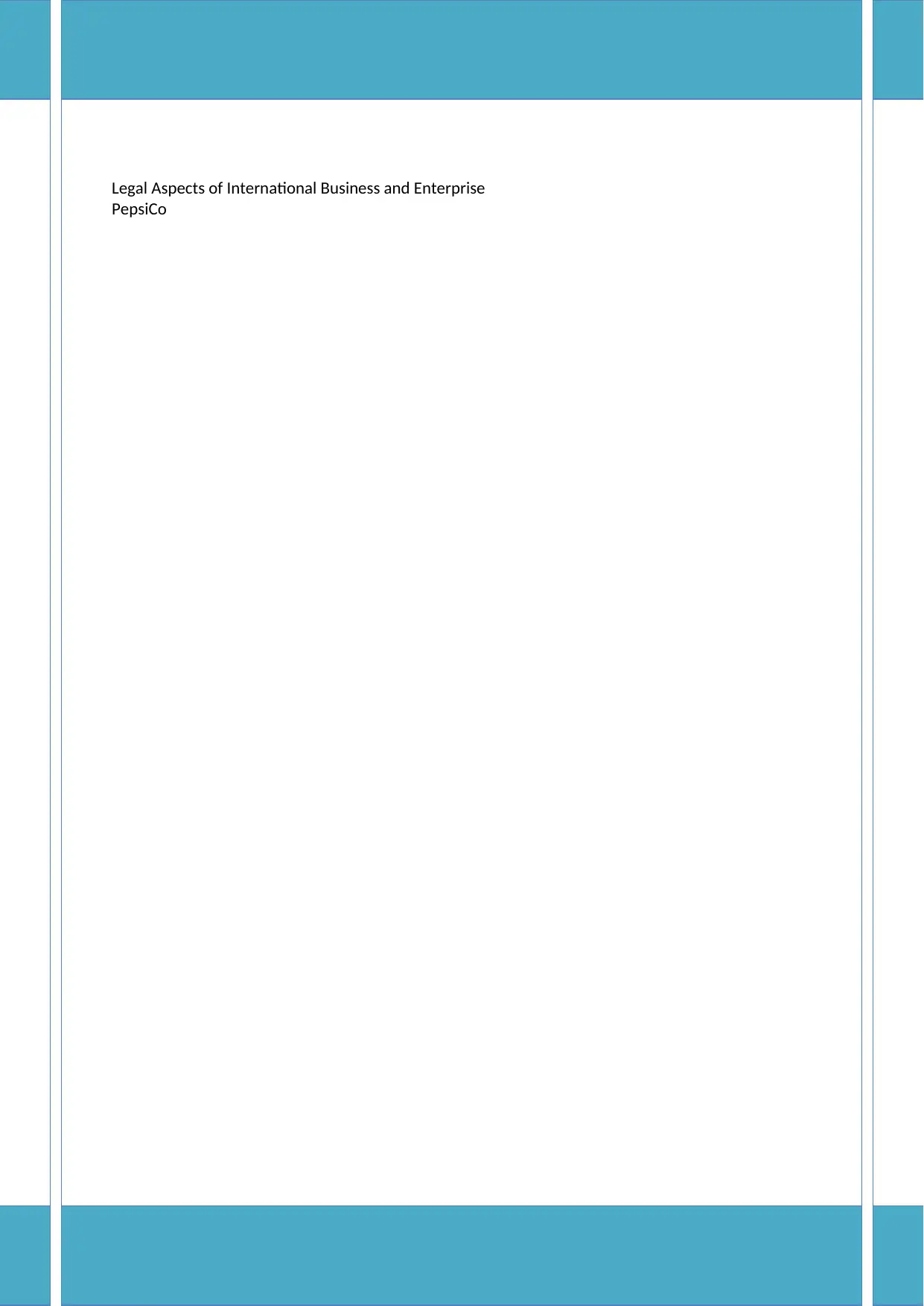
Legal Aspects of International Business and Enterprise
PepsiCo
PepsiCo
Paraphrase This Document
Need a fresh take? Get an instant paraphrase of this document with our AI Paraphraser
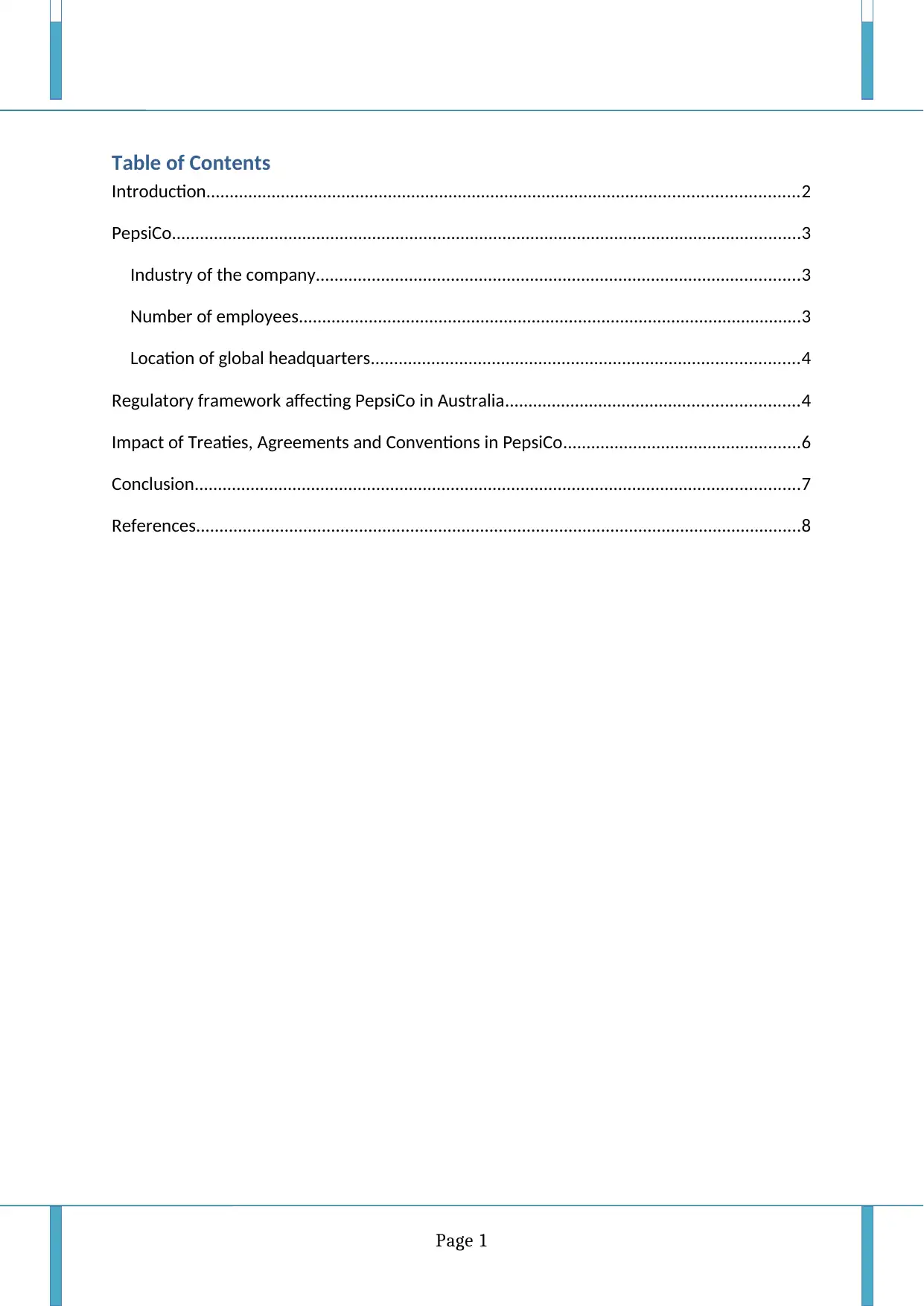
Table of Contents
Introduction...............................................................................................................................2
PepsiCo.......................................................................................................................................3
Industry of the company........................................................................................................3
Number of employees............................................................................................................3
Location of global headquarters............................................................................................4
Regulatory framework affecting PepsiCo in Australia...............................................................4
Impact of Treaties, Agreements and Conventions in PepsiCo...................................................6
Conclusion..................................................................................................................................7
References..................................................................................................................................8
Page 1
Introduction...............................................................................................................................2
PepsiCo.......................................................................................................................................3
Industry of the company........................................................................................................3
Number of employees............................................................................................................3
Location of global headquarters............................................................................................4
Regulatory framework affecting PepsiCo in Australia...............................................................4
Impact of Treaties, Agreements and Conventions in PepsiCo...................................................6
Conclusion..................................................................................................................................7
References..................................................................................................................................8
Page 1
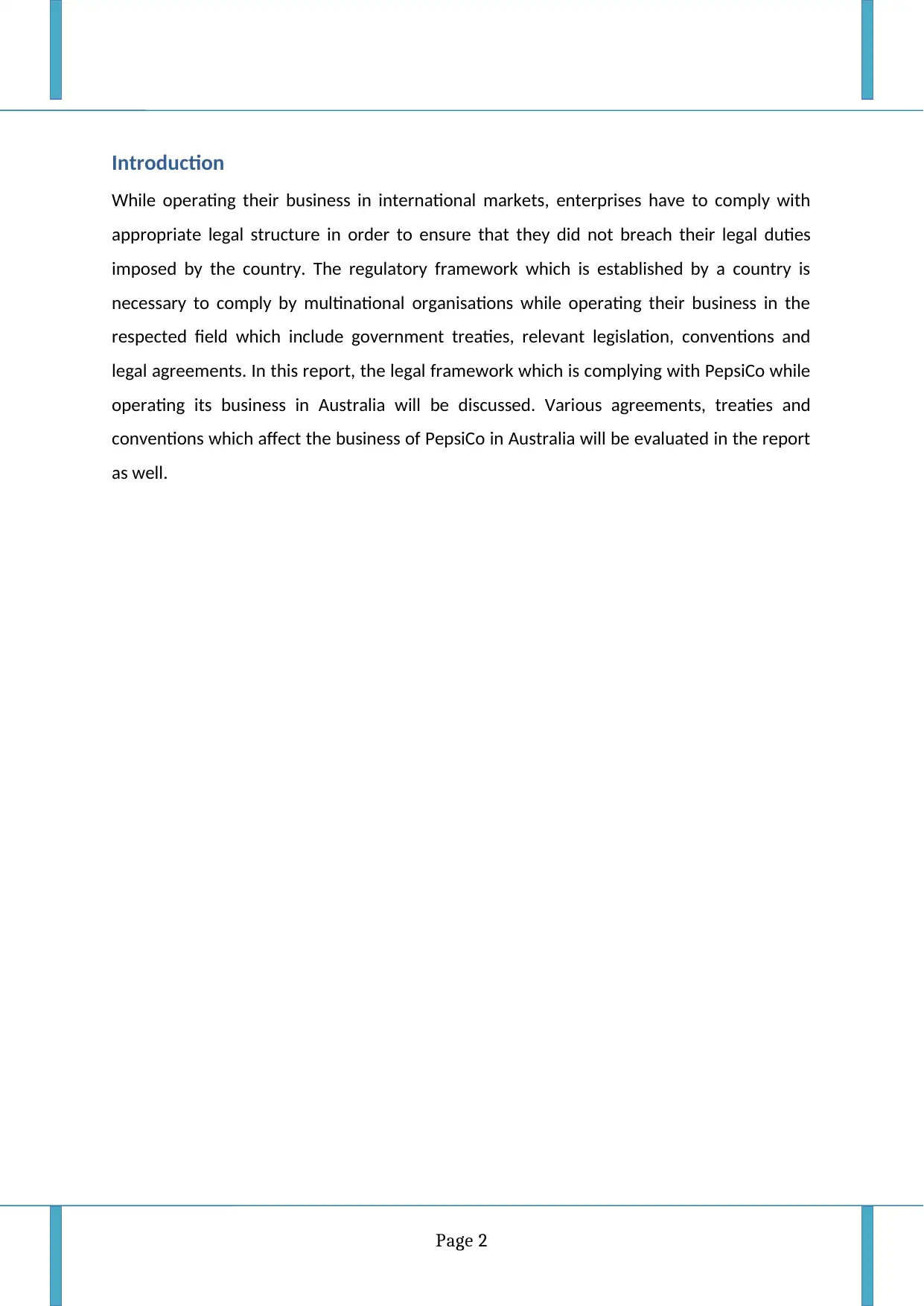
Introduction
While operating their business in international markets, enterprises have to comply with
appropriate legal structure in order to ensure that they did not breach their legal duties
imposed by the country. The regulatory framework which is established by a country is
necessary to comply by multinational organisations while operating their business in the
respected field which include government treaties, relevant legislation, conventions and
legal agreements. In this report, the legal framework which is complying with PepsiCo while
operating its business in Australia will be discussed. Various agreements, treaties and
conventions which affect the business of PepsiCo in Australia will be evaluated in the report
as well.
Page 2
While operating their business in international markets, enterprises have to comply with
appropriate legal structure in order to ensure that they did not breach their legal duties
imposed by the country. The regulatory framework which is established by a country is
necessary to comply by multinational organisations while operating their business in the
respected field which include government treaties, relevant legislation, conventions and
legal agreements. In this report, the legal framework which is complying with PepsiCo while
operating its business in Australia will be discussed. Various agreements, treaties and
conventions which affect the business of PepsiCo in Australia will be evaluated in the report
as well.
Page 2
⊘ This is a preview!⊘
Do you want full access?
Subscribe today to unlock all pages.

Trusted by 1+ million students worldwide
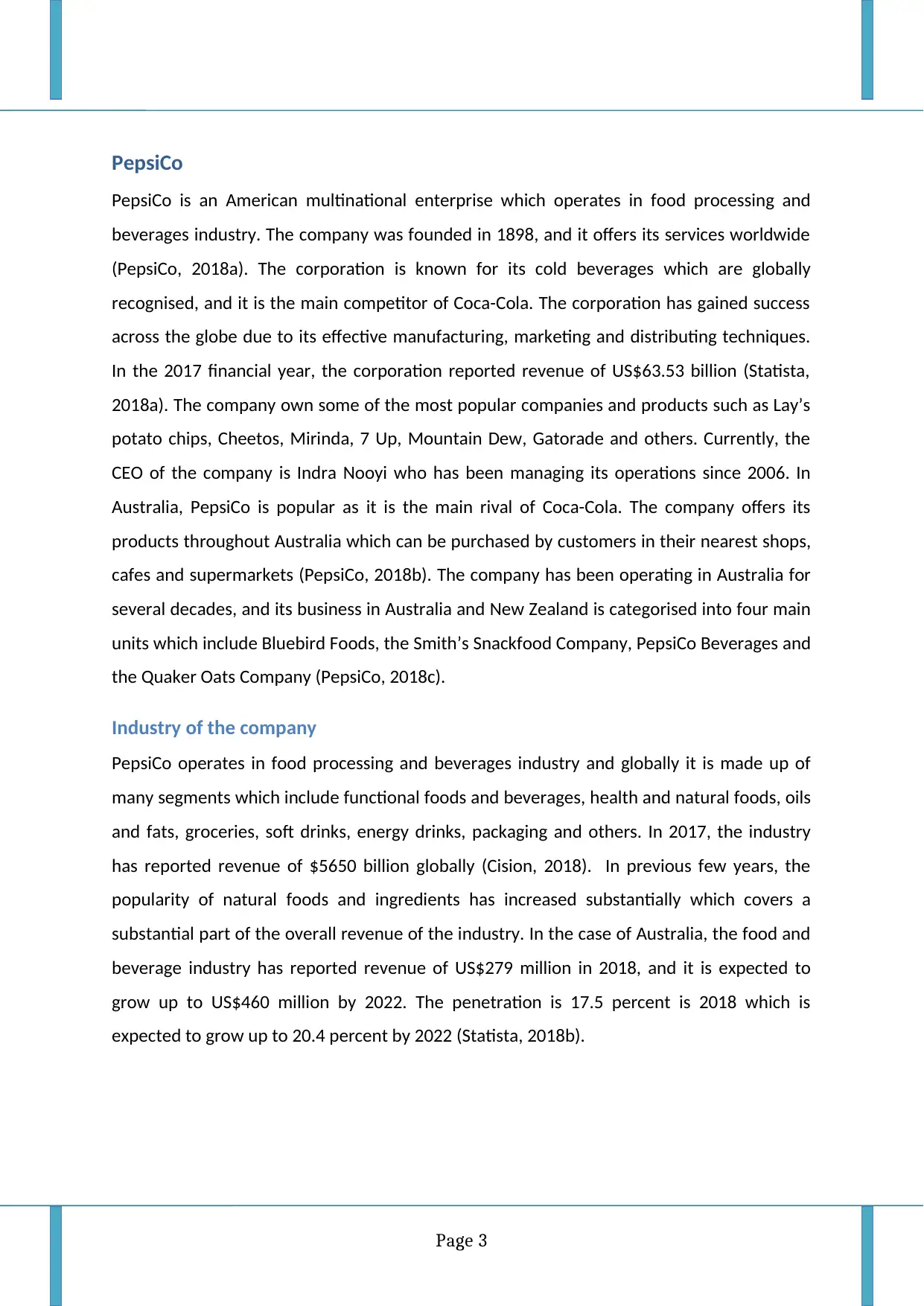
PepsiCo
PepsiCo is an American multinational enterprise which operates in food processing and
beverages industry. The company was founded in 1898, and it offers its services worldwide
(PepsiCo, 2018a). The corporation is known for its cold beverages which are globally
recognised, and it is the main competitor of Coca-Cola. The corporation has gained success
across the globe due to its effective manufacturing, marketing and distributing techniques.
In the 2017 financial year, the corporation reported revenue of US$63.53 billion (Statista,
2018a). The company own some of the most popular companies and products such as Lay’s
potato chips, Cheetos, Mirinda, 7 Up, Mountain Dew, Gatorade and others. Currently, the
CEO of the company is Indra Nooyi who has been managing its operations since 2006. In
Australia, PepsiCo is popular as it is the main rival of Coca-Cola. The company offers its
products throughout Australia which can be purchased by customers in their nearest shops,
cafes and supermarkets (PepsiCo, 2018b). The company has been operating in Australia for
several decades, and its business in Australia and New Zealand is categorised into four main
units which include Bluebird Foods, the Smith’s Snackfood Company, PepsiCo Beverages and
the Quaker Oats Company (PepsiCo, 2018c).
Industry of the company
PepsiCo operates in food processing and beverages industry and globally it is made up of
many segments which include functional foods and beverages, health and natural foods, oils
and fats, groceries, soft drinks, energy drinks, packaging and others. In 2017, the industry
has reported revenue of $5650 billion globally (Cision, 2018). In previous few years, the
popularity of natural foods and ingredients has increased substantially which covers a
substantial part of the overall revenue of the industry. In the case of Australia, the food and
beverage industry has reported revenue of US$279 million in 2018, and it is expected to
grow up to US$460 million by 2022. The penetration is 17.5 percent is 2018 which is
expected to grow up to 20.4 percent by 2022 (Statista, 2018b).
Page 3
PepsiCo is an American multinational enterprise which operates in food processing and
beverages industry. The company was founded in 1898, and it offers its services worldwide
(PepsiCo, 2018a). The corporation is known for its cold beverages which are globally
recognised, and it is the main competitor of Coca-Cola. The corporation has gained success
across the globe due to its effective manufacturing, marketing and distributing techniques.
In the 2017 financial year, the corporation reported revenue of US$63.53 billion (Statista,
2018a). The company own some of the most popular companies and products such as Lay’s
potato chips, Cheetos, Mirinda, 7 Up, Mountain Dew, Gatorade and others. Currently, the
CEO of the company is Indra Nooyi who has been managing its operations since 2006. In
Australia, PepsiCo is popular as it is the main rival of Coca-Cola. The company offers its
products throughout Australia which can be purchased by customers in their nearest shops,
cafes and supermarkets (PepsiCo, 2018b). The company has been operating in Australia for
several decades, and its business in Australia and New Zealand is categorised into four main
units which include Bluebird Foods, the Smith’s Snackfood Company, PepsiCo Beverages and
the Quaker Oats Company (PepsiCo, 2018c).
Industry of the company
PepsiCo operates in food processing and beverages industry and globally it is made up of
many segments which include functional foods and beverages, health and natural foods, oils
and fats, groceries, soft drinks, energy drinks, packaging and others. In 2017, the industry
has reported revenue of $5650 billion globally (Cision, 2018). In previous few years, the
popularity of natural foods and ingredients has increased substantially which covers a
substantial part of the overall revenue of the industry. In the case of Australia, the food and
beverage industry has reported revenue of US$279 million in 2018, and it is expected to
grow up to US$460 million by 2022. The penetration is 17.5 percent is 2018 which is
expected to grow up to 20.4 percent by 2022 (Statista, 2018b).
Page 3
Paraphrase This Document
Need a fresh take? Get an instant paraphrase of this document with our AI Paraphraser
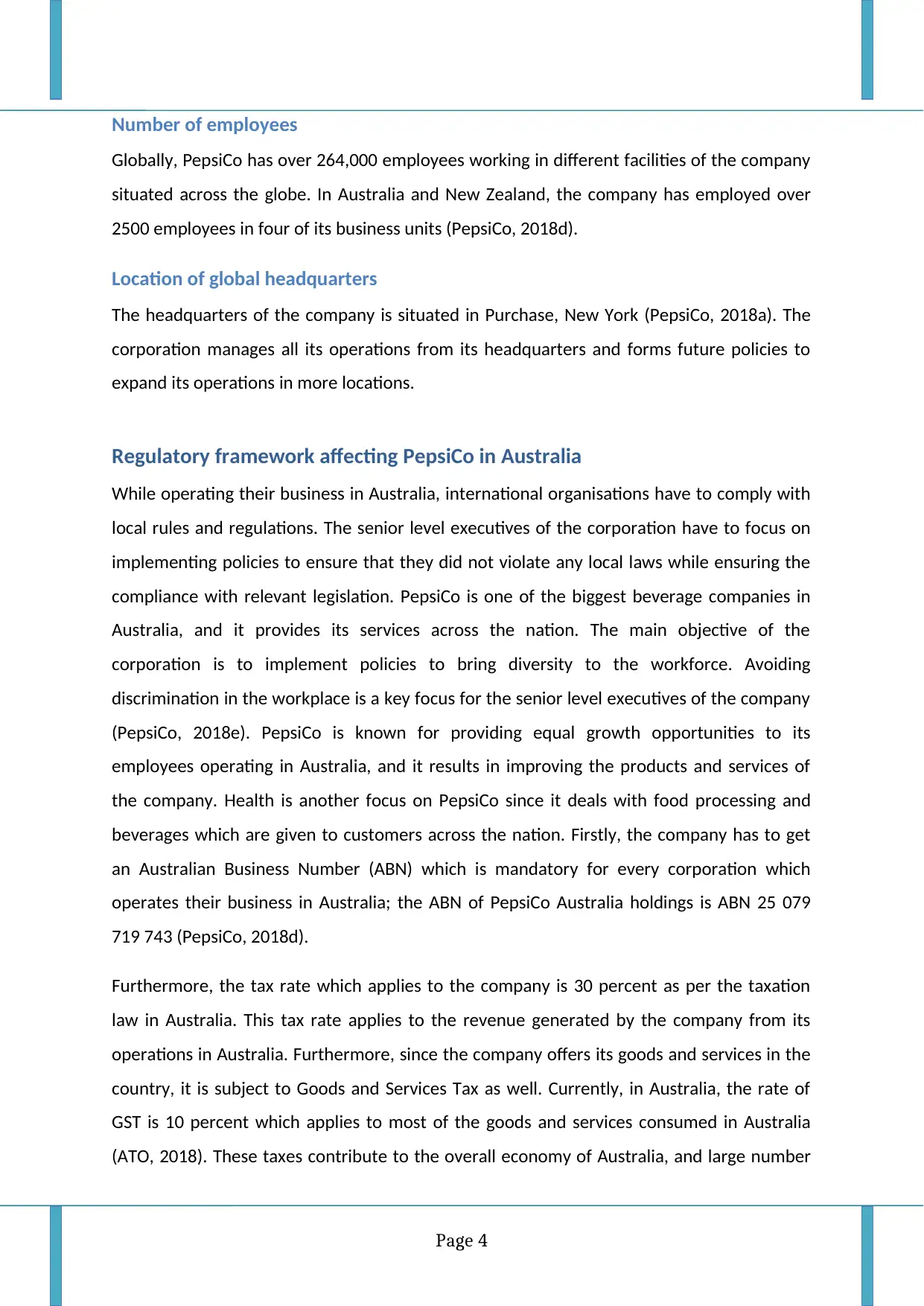
Number of employees
Globally, PepsiCo has over 264,000 employees working in different facilities of the company
situated across the globe. In Australia and New Zealand, the company has employed over
2500 employees in four of its business units (PepsiCo, 2018d).
Location of global headquarters
The headquarters of the company is situated in Purchase, New York (PepsiCo, 2018a). The
corporation manages all its operations from its headquarters and forms future policies to
expand its operations in more locations.
Regulatory framework affecting PepsiCo in Australia
While operating their business in Australia, international organisations have to comply with
local rules and regulations. The senior level executives of the corporation have to focus on
implementing policies to ensure that they did not violate any local laws while ensuring the
compliance with relevant legislation. PepsiCo is one of the biggest beverage companies in
Australia, and it provides its services across the nation. The main objective of the
corporation is to implement policies to bring diversity to the workforce. Avoiding
discrimination in the workplace is a key focus for the senior level executives of the company
(PepsiCo, 2018e). PepsiCo is known for providing equal growth opportunities to its
employees operating in Australia, and it results in improving the products and services of
the company. Health is another focus on PepsiCo since it deals with food processing and
beverages which are given to customers across the nation. Firstly, the company has to get
an Australian Business Number (ABN) which is mandatory for every corporation which
operates their business in Australia; the ABN of PepsiCo Australia holdings is ABN 25 079
719 743 (PepsiCo, 2018d).
Furthermore, the tax rate which applies to the company is 30 percent as per the taxation
law in Australia. This tax rate applies to the revenue generated by the company from its
operations in Australia. Furthermore, since the company offers its goods and services in the
country, it is subject to Goods and Services Tax as well. Currently, in Australia, the rate of
GST is 10 percent which applies to most of the goods and services consumed in Australia
(ATO, 2018). These taxes contribute to the overall economy of Australia, and large number
Page 4
Globally, PepsiCo has over 264,000 employees working in different facilities of the company
situated across the globe. In Australia and New Zealand, the company has employed over
2500 employees in four of its business units (PepsiCo, 2018d).
Location of global headquarters
The headquarters of the company is situated in Purchase, New York (PepsiCo, 2018a). The
corporation manages all its operations from its headquarters and forms future policies to
expand its operations in more locations.
Regulatory framework affecting PepsiCo in Australia
While operating their business in Australia, international organisations have to comply with
local rules and regulations. The senior level executives of the corporation have to focus on
implementing policies to ensure that they did not violate any local laws while ensuring the
compliance with relevant legislation. PepsiCo is one of the biggest beverage companies in
Australia, and it provides its services across the nation. The main objective of the
corporation is to implement policies to bring diversity to the workforce. Avoiding
discrimination in the workplace is a key focus for the senior level executives of the company
(PepsiCo, 2018e). PepsiCo is known for providing equal growth opportunities to its
employees operating in Australia, and it results in improving the products and services of
the company. Health is another focus on PepsiCo since it deals with food processing and
beverages which are given to customers across the nation. Firstly, the company has to get
an Australian Business Number (ABN) which is mandatory for every corporation which
operates their business in Australia; the ABN of PepsiCo Australia holdings is ABN 25 079
719 743 (PepsiCo, 2018d).
Furthermore, the tax rate which applies to the company is 30 percent as per the taxation
law in Australia. This tax rate applies to the revenue generated by the company from its
operations in Australia. Furthermore, since the company offers its goods and services in the
country, it is subject to Goods and Services Tax as well. Currently, in Australia, the rate of
GST is 10 percent which applies to most of the goods and services consumed in Australia
(ATO, 2018). These taxes contribute to the overall economy of Australia, and large number
Page 4
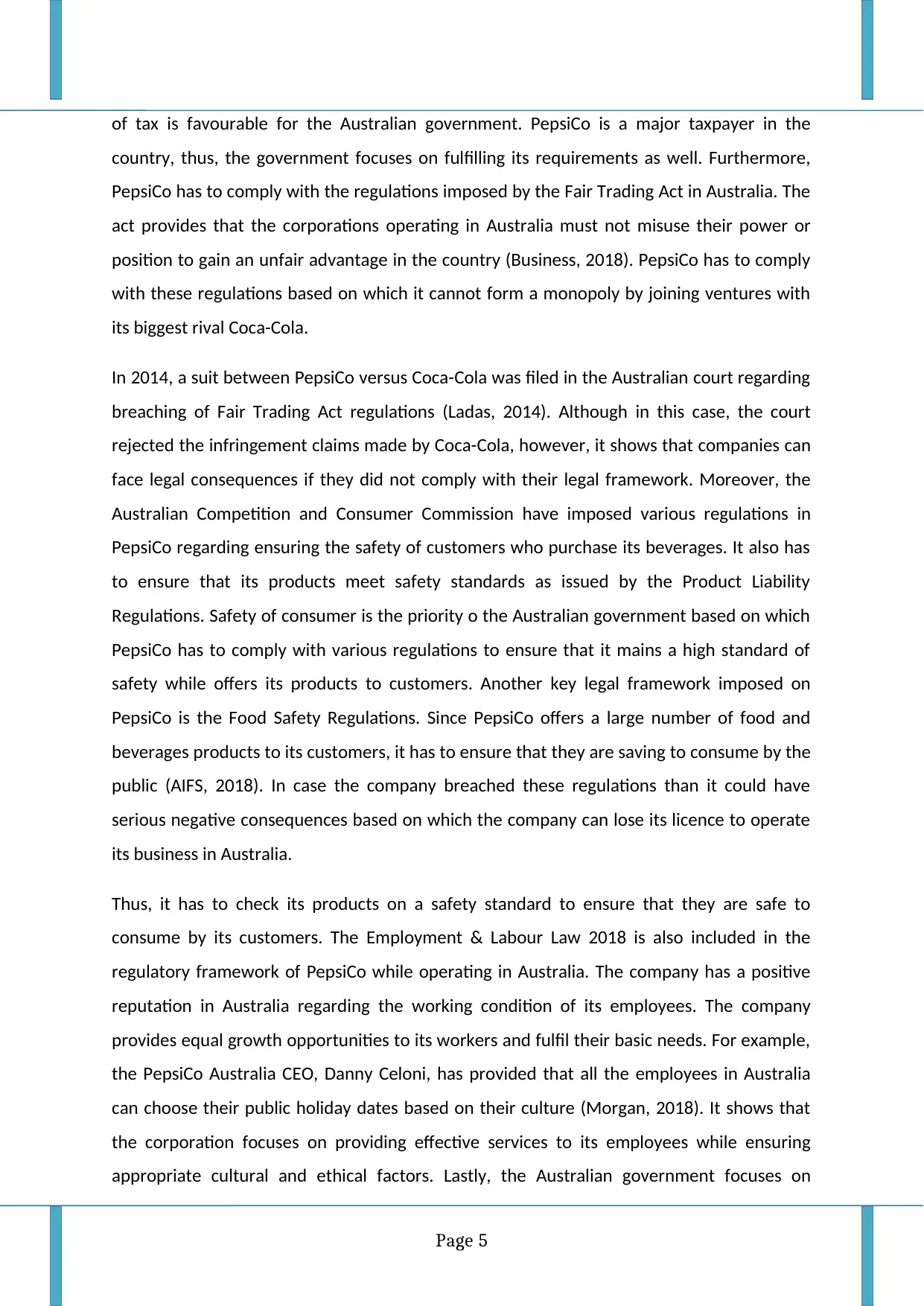
of tax is favourable for the Australian government. PepsiCo is a major taxpayer in the
country, thus, the government focuses on fulfilling its requirements as well. Furthermore,
PepsiCo has to comply with the regulations imposed by the Fair Trading Act in Australia. The
act provides that the corporations operating in Australia must not misuse their power or
position to gain an unfair advantage in the country (Business, 2018). PepsiCo has to comply
with these regulations based on which it cannot form a monopoly by joining ventures with
its biggest rival Coca-Cola.
In 2014, a suit between PepsiCo versus Coca-Cola was filed in the Australian court regarding
breaching of Fair Trading Act regulations (Ladas, 2014). Although in this case, the court
rejected the infringement claims made by Coca-Cola, however, it shows that companies can
face legal consequences if they did not comply with their legal framework. Moreover, the
Australian Competition and Consumer Commission have imposed various regulations in
PepsiCo regarding ensuring the safety of customers who purchase its beverages. It also has
to ensure that its products meet safety standards as issued by the Product Liability
Regulations. Safety of consumer is the priority o the Australian government based on which
PepsiCo has to comply with various regulations to ensure that it mains a high standard of
safety while offers its products to customers. Another key legal framework imposed on
PepsiCo is the Food Safety Regulations. Since PepsiCo offers a large number of food and
beverages products to its customers, it has to ensure that they are saving to consume by the
public (AIFS, 2018). In case the company breached these regulations than it could have
serious negative consequences based on which the company can lose its licence to operate
its business in Australia.
Thus, it has to check its products on a safety standard to ensure that they are safe to
consume by its customers. The Employment & Labour Law 2018 is also included in the
regulatory framework of PepsiCo while operating in Australia. The company has a positive
reputation in Australia regarding the working condition of its employees. The company
provides equal growth opportunities to its workers and fulfil their basic needs. For example,
the PepsiCo Australia CEO, Danny Celoni, has provided that all the employees in Australia
can choose their public holiday dates based on their culture (Morgan, 2018). It shows that
the corporation focuses on providing effective services to its employees while ensuring
appropriate cultural and ethical factors. Lastly, the Australian government focuses on
Page 5
country, thus, the government focuses on fulfilling its requirements as well. Furthermore,
PepsiCo has to comply with the regulations imposed by the Fair Trading Act in Australia. The
act provides that the corporations operating in Australia must not misuse their power or
position to gain an unfair advantage in the country (Business, 2018). PepsiCo has to comply
with these regulations based on which it cannot form a monopoly by joining ventures with
its biggest rival Coca-Cola.
In 2014, a suit between PepsiCo versus Coca-Cola was filed in the Australian court regarding
breaching of Fair Trading Act regulations (Ladas, 2014). Although in this case, the court
rejected the infringement claims made by Coca-Cola, however, it shows that companies can
face legal consequences if they did not comply with their legal framework. Moreover, the
Australian Competition and Consumer Commission have imposed various regulations in
PepsiCo regarding ensuring the safety of customers who purchase its beverages. It also has
to ensure that its products meet safety standards as issued by the Product Liability
Regulations. Safety of consumer is the priority o the Australian government based on which
PepsiCo has to comply with various regulations to ensure that it mains a high standard of
safety while offers its products to customers. Another key legal framework imposed on
PepsiCo is the Food Safety Regulations. Since PepsiCo offers a large number of food and
beverages products to its customers, it has to ensure that they are saving to consume by the
public (AIFS, 2018). In case the company breached these regulations than it could have
serious negative consequences based on which the company can lose its licence to operate
its business in Australia.
Thus, it has to check its products on a safety standard to ensure that they are safe to
consume by its customers. The Employment & Labour Law 2018 is also included in the
regulatory framework of PepsiCo while operating in Australia. The company has a positive
reputation in Australia regarding the working condition of its employees. The company
provides equal growth opportunities to its workers and fulfil their basic needs. For example,
the PepsiCo Australia CEO, Danny Celoni, has provided that all the employees in Australia
can choose their public holiday dates based on their culture (Morgan, 2018). It shows that
the corporation focuses on providing effective services to its employees while ensuring
appropriate cultural and ethical factors. Lastly, the Australian government focuses on
Page 5
⊘ This is a preview!⊘
Do you want full access?
Subscribe today to unlock all pages.

Trusted by 1+ million students worldwide
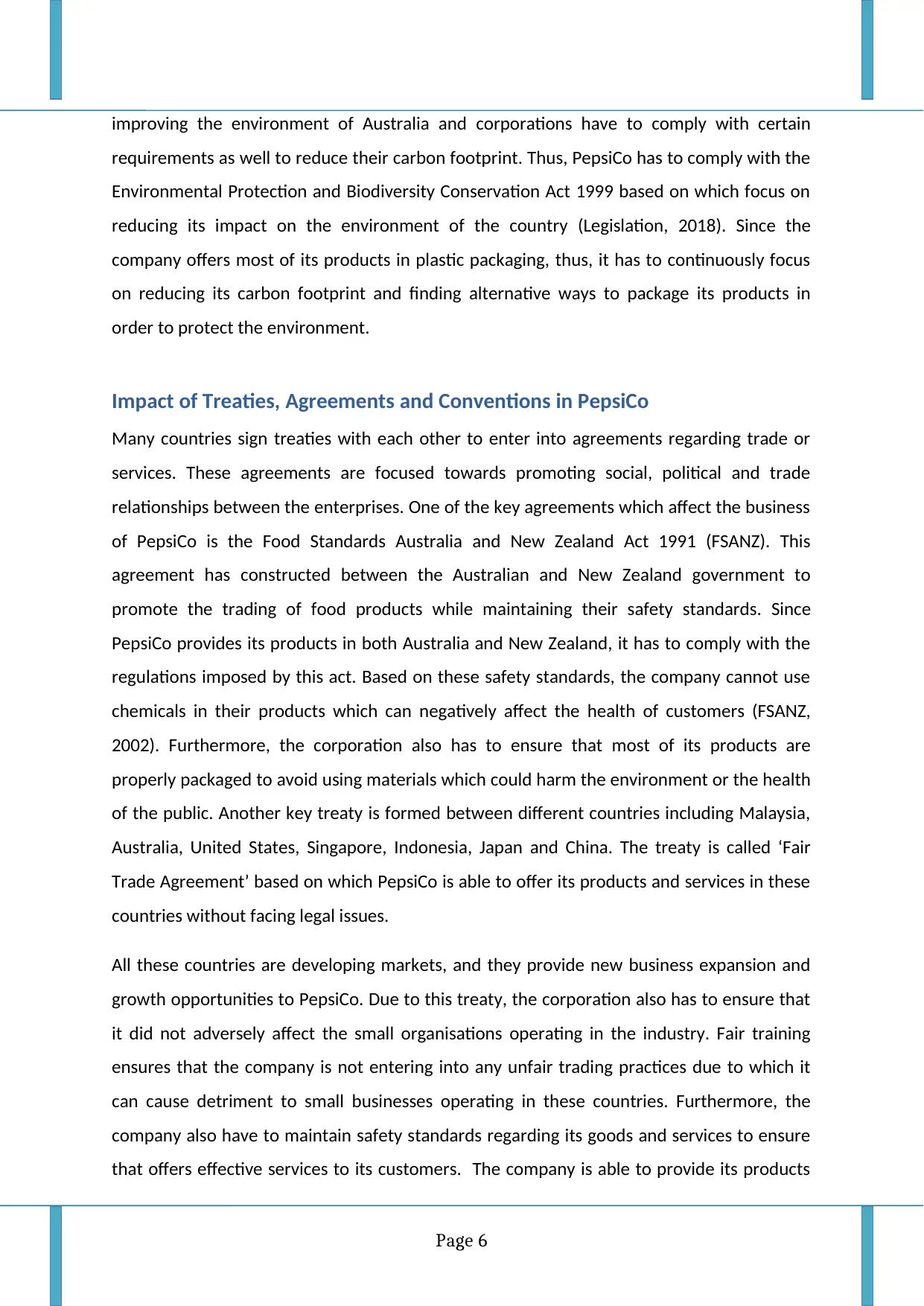
improving the environment of Australia and corporations have to comply with certain
requirements as well to reduce their carbon footprint. Thus, PepsiCo has to comply with the
Environmental Protection and Biodiversity Conservation Act 1999 based on which focus on
reducing its impact on the environment of the country (Legislation, 2018). Since the
company offers most of its products in plastic packaging, thus, it has to continuously focus
on reducing its carbon footprint and finding alternative ways to package its products in
order to protect the environment.
Impact of Treaties, Agreements and Conventions in PepsiCo
Many countries sign treaties with each other to enter into agreements regarding trade or
services. These agreements are focused towards promoting social, political and trade
relationships between the enterprises. One of the key agreements which affect the business
of PepsiCo is the Food Standards Australia and New Zealand Act 1991 (FSANZ). This
agreement has constructed between the Australian and New Zealand government to
promote the trading of food products while maintaining their safety standards. Since
PepsiCo provides its products in both Australia and New Zealand, it has to comply with the
regulations imposed by this act. Based on these safety standards, the company cannot use
chemicals in their products which can negatively affect the health of customers (FSANZ,
2002). Furthermore, the corporation also has to ensure that most of its products are
properly packaged to avoid using materials which could harm the environment or the health
of the public. Another key treaty is formed between different countries including Malaysia,
Australia, United States, Singapore, Indonesia, Japan and China. The treaty is called ‘Fair
Trade Agreement’ based on which PepsiCo is able to offer its products and services in these
countries without facing legal issues.
All these countries are developing markets, and they provide new business expansion and
growth opportunities to PepsiCo. Due to this treaty, the corporation also has to ensure that
it did not adversely affect the small organisations operating in the industry. Fair training
ensures that the company is not entering into any unfair trading practices due to which it
can cause detriment to small businesses operating in these countries. Furthermore, the
company also have to maintain safety standards regarding its goods and services to ensure
that offers effective services to its customers. The company is able to provide its products
Page 6
requirements as well to reduce their carbon footprint. Thus, PepsiCo has to comply with the
Environmental Protection and Biodiversity Conservation Act 1999 based on which focus on
reducing its impact on the environment of the country (Legislation, 2018). Since the
company offers most of its products in plastic packaging, thus, it has to continuously focus
on reducing its carbon footprint and finding alternative ways to package its products in
order to protect the environment.
Impact of Treaties, Agreements and Conventions in PepsiCo
Many countries sign treaties with each other to enter into agreements regarding trade or
services. These agreements are focused towards promoting social, political and trade
relationships between the enterprises. One of the key agreements which affect the business
of PepsiCo is the Food Standards Australia and New Zealand Act 1991 (FSANZ). This
agreement has constructed between the Australian and New Zealand government to
promote the trading of food products while maintaining their safety standards. Since
PepsiCo provides its products in both Australia and New Zealand, it has to comply with the
regulations imposed by this act. Based on these safety standards, the company cannot use
chemicals in their products which can negatively affect the health of customers (FSANZ,
2002). Furthermore, the corporation also has to ensure that most of its products are
properly packaged to avoid using materials which could harm the environment or the health
of the public. Another key treaty is formed between different countries including Malaysia,
Australia, United States, Singapore, Indonesia, Japan and China. The treaty is called ‘Fair
Trade Agreement’ based on which PepsiCo is able to offer its products and services in these
countries without facing legal issues.
All these countries are developing markets, and they provide new business expansion and
growth opportunities to PepsiCo. Due to this treaty, the corporation also has to ensure that
it did not adversely affect the small organisations operating in the industry. Fair training
ensures that the company is not entering into any unfair trading practices due to which it
can cause detriment to small businesses operating in these countries. Furthermore, the
company also have to maintain safety standards regarding its goods and services to ensure
that offers effective services to its customers. The company is able to provide its products
Page 6
Paraphrase This Document
Need a fresh take? Get an instant paraphrase of this document with our AI Paraphraser
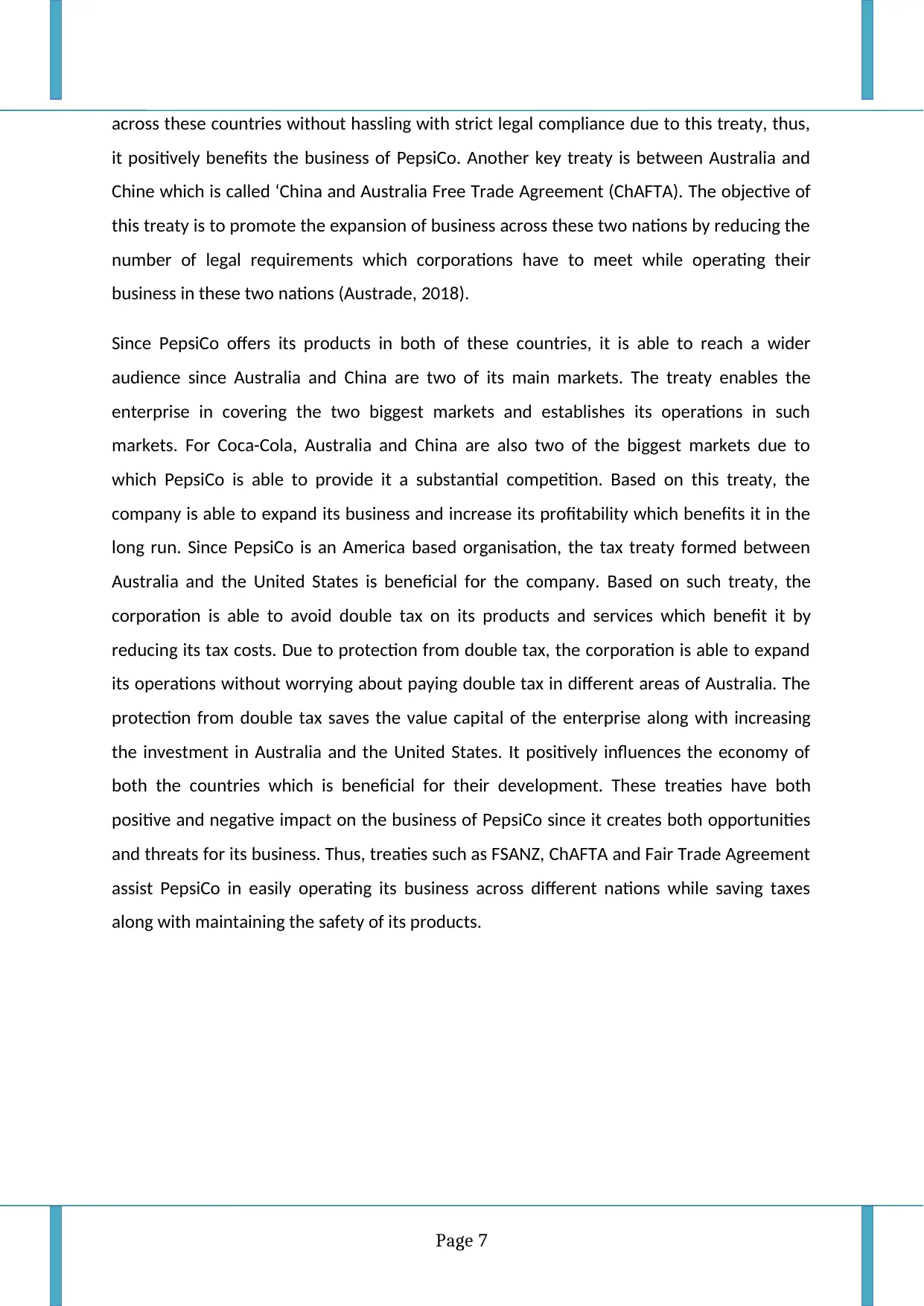
across these countries without hassling with strict legal compliance due to this treaty, thus,
it positively benefits the business of PepsiCo. Another key treaty is between Australia and
Chine which is called ‘China and Australia Free Trade Agreement (ChAFTA). The objective of
this treaty is to promote the expansion of business across these two nations by reducing the
number of legal requirements which corporations have to meet while operating their
business in these two nations (Austrade, 2018).
Since PepsiCo offers its products in both of these countries, it is able to reach a wider
audience since Australia and China are two of its main markets. The treaty enables the
enterprise in covering the two biggest markets and establishes its operations in such
markets. For Coca-Cola, Australia and China are also two of the biggest markets due to
which PepsiCo is able to provide it a substantial competition. Based on this treaty, the
company is able to expand its business and increase its profitability which benefits it in the
long run. Since PepsiCo is an America based organisation, the tax treaty formed between
Australia and the United States is beneficial for the company. Based on such treaty, the
corporation is able to avoid double tax on its products and services which benefit it by
reducing its tax costs. Due to protection from double tax, the corporation is able to expand
its operations without worrying about paying double tax in different areas of Australia. The
protection from double tax saves the value capital of the enterprise along with increasing
the investment in Australia and the United States. It positively influences the economy of
both the countries which is beneficial for their development. These treaties have both
positive and negative impact on the business of PepsiCo since it creates both opportunities
and threats for its business. Thus, treaties such as FSANZ, ChAFTA and Fair Trade Agreement
assist PepsiCo in easily operating its business across different nations while saving taxes
along with maintaining the safety of its products.
Page 7
it positively benefits the business of PepsiCo. Another key treaty is between Australia and
Chine which is called ‘China and Australia Free Trade Agreement (ChAFTA). The objective of
this treaty is to promote the expansion of business across these two nations by reducing the
number of legal requirements which corporations have to meet while operating their
business in these two nations (Austrade, 2018).
Since PepsiCo offers its products in both of these countries, it is able to reach a wider
audience since Australia and China are two of its main markets. The treaty enables the
enterprise in covering the two biggest markets and establishes its operations in such
markets. For Coca-Cola, Australia and China are also two of the biggest markets due to
which PepsiCo is able to provide it a substantial competition. Based on this treaty, the
company is able to expand its business and increase its profitability which benefits it in the
long run. Since PepsiCo is an America based organisation, the tax treaty formed between
Australia and the United States is beneficial for the company. Based on such treaty, the
corporation is able to avoid double tax on its products and services which benefit it by
reducing its tax costs. Due to protection from double tax, the corporation is able to expand
its operations without worrying about paying double tax in different areas of Australia. The
protection from double tax saves the value capital of the enterprise along with increasing
the investment in Australia and the United States. It positively influences the economy of
both the countries which is beneficial for their development. These treaties have both
positive and negative impact on the business of PepsiCo since it creates both opportunities
and threats for its business. Thus, treaties such as FSANZ, ChAFTA and Fair Trade Agreement
assist PepsiCo in easily operating its business across different nations while saving taxes
along with maintaining the safety of its products.
Page 7
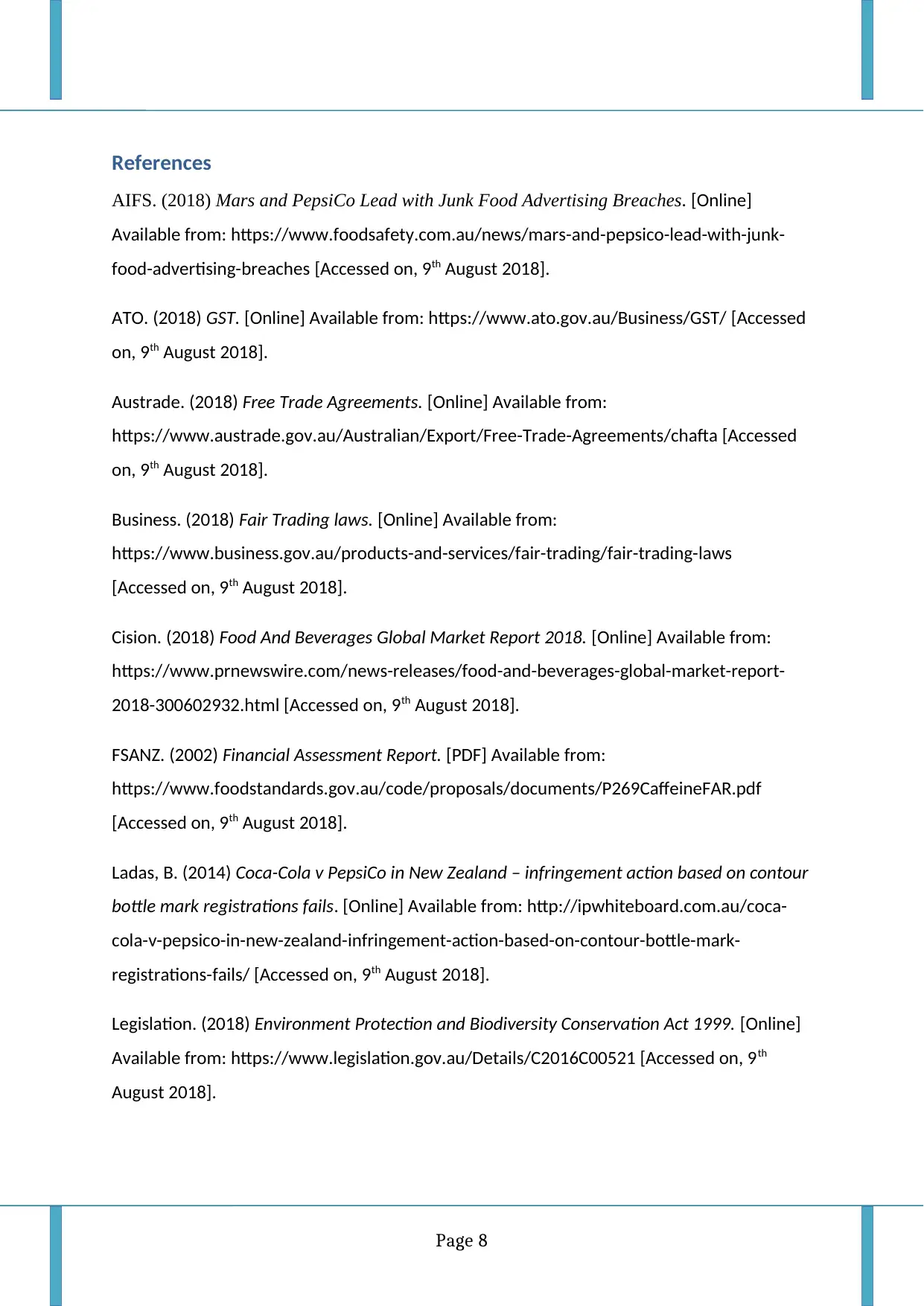
References
AIFS. (2018) Mars and PepsiCo Lead with Junk Food Advertising Breaches. [Online]
Available from: https://www.foodsafety.com.au/news/mars-and-pepsico-lead-with-junk-
food-advertising-breaches [Accessed on, 9th August 2018].
ATO. (2018) GST. [Online] Available from: https://www.ato.gov.au/Business/GST/ [Accessed
on, 9th August 2018].
Austrade. (2018) Free Trade Agreements. [Online] Available from:
https://www.austrade.gov.au/Australian/Export/Free-Trade-Agreements/chafta [Accessed
on, 9th August 2018].
Business. (2018) Fair Trading laws. [Online] Available from:
https://www.business.gov.au/products-and-services/fair-trading/fair-trading-laws
[Accessed on, 9th August 2018].
Cision. (2018) Food And Beverages Global Market Report 2018. [Online] Available from:
https://www.prnewswire.com/news-releases/food-and-beverages-global-market-report-
2018-300602932.html [Accessed on, 9th August 2018].
FSANZ. (2002) Financial Assessment Report. [PDF] Available from:
https://www.foodstandards.gov.au/code/proposals/documents/P269CaffeineFAR.pdf
[Accessed on, 9th August 2018].
Ladas, B. (2014) Coca-Cola v PepsiCo in New Zealand – infringement action based on contour
bottle mark registrations fails. [Online] Available from: http://ipwhiteboard.com.au/coca-
cola-v-pepsico-in-new-zealand-infringement-action-based-on-contour-bottle-mark-
registrations-fails/ [Accessed on, 9th August 2018].
Legislation. (2018) Environment Protection and Biodiversity Conservation Act 1999. [Online]
Available from: https://www.legislation.gov.au/Details/C2016C00521 [Accessed on, 9th
August 2018].
Page 8
AIFS. (2018) Mars and PepsiCo Lead with Junk Food Advertising Breaches. [Online]
Available from: https://www.foodsafety.com.au/news/mars-and-pepsico-lead-with-junk-
food-advertising-breaches [Accessed on, 9th August 2018].
ATO. (2018) GST. [Online] Available from: https://www.ato.gov.au/Business/GST/ [Accessed
on, 9th August 2018].
Austrade. (2018) Free Trade Agreements. [Online] Available from:
https://www.austrade.gov.au/Australian/Export/Free-Trade-Agreements/chafta [Accessed
on, 9th August 2018].
Business. (2018) Fair Trading laws. [Online] Available from:
https://www.business.gov.au/products-and-services/fair-trading/fair-trading-laws
[Accessed on, 9th August 2018].
Cision. (2018) Food And Beverages Global Market Report 2018. [Online] Available from:
https://www.prnewswire.com/news-releases/food-and-beverages-global-market-report-
2018-300602932.html [Accessed on, 9th August 2018].
FSANZ. (2002) Financial Assessment Report. [PDF] Available from:
https://www.foodstandards.gov.au/code/proposals/documents/P269CaffeineFAR.pdf
[Accessed on, 9th August 2018].
Ladas, B. (2014) Coca-Cola v PepsiCo in New Zealand – infringement action based on contour
bottle mark registrations fails. [Online] Available from: http://ipwhiteboard.com.au/coca-
cola-v-pepsico-in-new-zealand-infringement-action-based-on-contour-bottle-mark-
registrations-fails/ [Accessed on, 9th August 2018].
Legislation. (2018) Environment Protection and Biodiversity Conservation Act 1999. [Online]
Available from: https://www.legislation.gov.au/Details/C2016C00521 [Accessed on, 9th
August 2018].
Page 8
⊘ This is a preview!⊘
Do you want full access?
Subscribe today to unlock all pages.

Trusted by 1+ million students worldwide
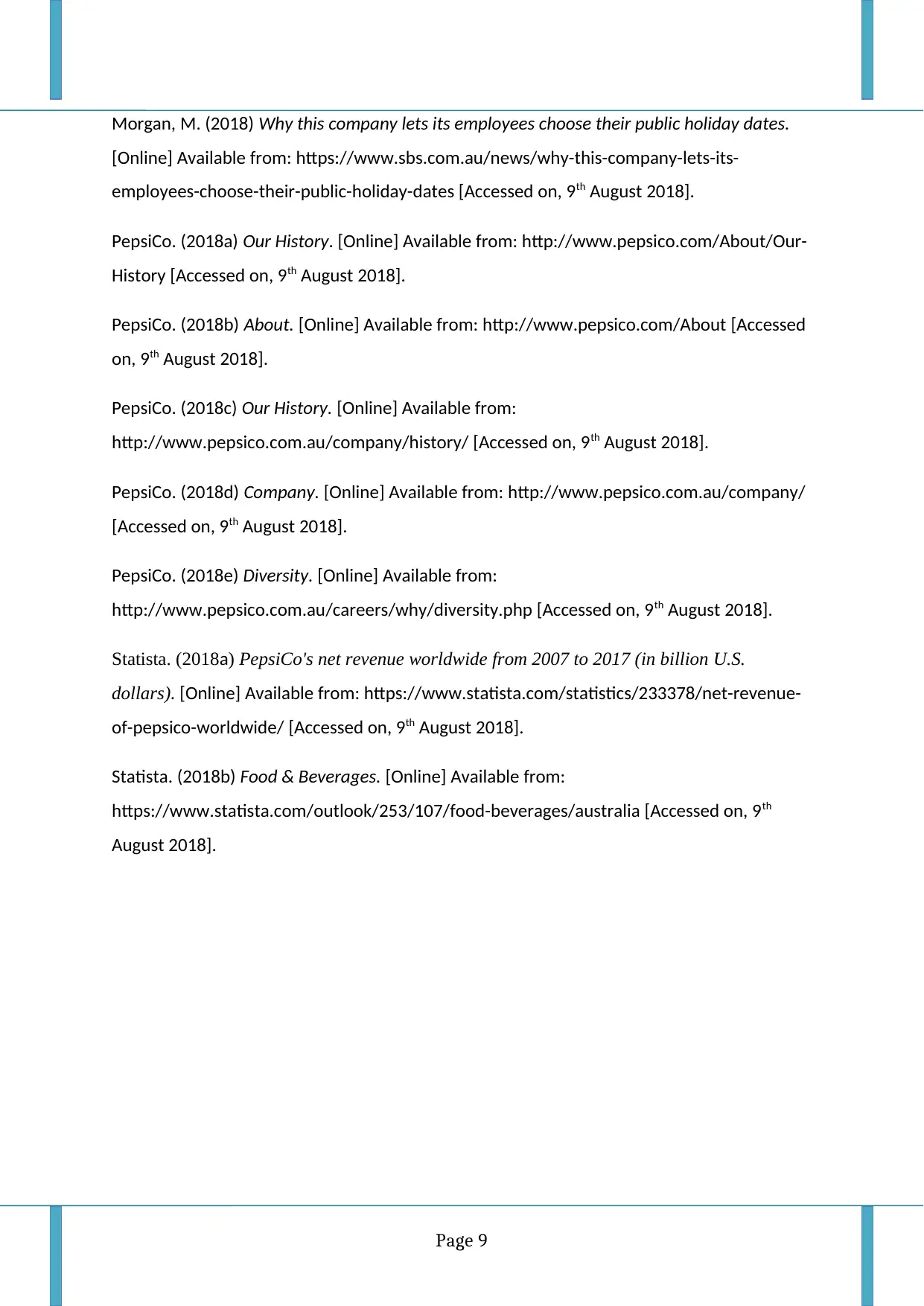
Morgan, M. (2018) Why this company lets its employees choose their public holiday dates.
[Online] Available from: https://www.sbs.com.au/news/why-this-company-lets-its-
employees-choose-their-public-holiday-dates [Accessed on, 9th August 2018].
PepsiCo. (2018a) Our History. [Online] Available from: http://www.pepsico.com/About/Our-
History [Accessed on, 9th August 2018].
PepsiCo. (2018b) About. [Online] Available from: http://www.pepsico.com/About [Accessed
on, 9th August 2018].
PepsiCo. (2018c) Our History. [Online] Available from:
http://www.pepsico.com.au/company/history/ [Accessed on, 9th August 2018].
PepsiCo. (2018d) Company. [Online] Available from: http://www.pepsico.com.au/company/
[Accessed on, 9th August 2018].
PepsiCo. (2018e) Diversity. [Online] Available from:
http://www.pepsico.com.au/careers/why/diversity.php [Accessed on, 9th August 2018].
Statista. (2018a) PepsiCo's net revenue worldwide from 2007 to 2017 (in billion U.S.
dollars). [Online] Available from: https://www.statista.com/statistics/233378/net-revenue-
of-pepsico-worldwide/ [Accessed on, 9th August 2018].
Statista. (2018b) Food & Beverages. [Online] Available from:
https://www.statista.com/outlook/253/107/food-beverages/australia [Accessed on, 9th
August 2018].
Page 9
[Online] Available from: https://www.sbs.com.au/news/why-this-company-lets-its-
employees-choose-their-public-holiday-dates [Accessed on, 9th August 2018].
PepsiCo. (2018a) Our History. [Online] Available from: http://www.pepsico.com/About/Our-
History [Accessed on, 9th August 2018].
PepsiCo. (2018b) About. [Online] Available from: http://www.pepsico.com/About [Accessed
on, 9th August 2018].
PepsiCo. (2018c) Our History. [Online] Available from:
http://www.pepsico.com.au/company/history/ [Accessed on, 9th August 2018].
PepsiCo. (2018d) Company. [Online] Available from: http://www.pepsico.com.au/company/
[Accessed on, 9th August 2018].
PepsiCo. (2018e) Diversity. [Online] Available from:
http://www.pepsico.com.au/careers/why/diversity.php [Accessed on, 9th August 2018].
Statista. (2018a) PepsiCo's net revenue worldwide from 2007 to 2017 (in billion U.S.
dollars). [Online] Available from: https://www.statista.com/statistics/233378/net-revenue-
of-pepsico-worldwide/ [Accessed on, 9th August 2018].
Statista. (2018b) Food & Beverages. [Online] Available from:
https://www.statista.com/outlook/253/107/food-beverages/australia [Accessed on, 9th
August 2018].
Page 9
1 out of 10
Related Documents
Your All-in-One AI-Powered Toolkit for Academic Success.
+13062052269
info@desklib.com
Available 24*7 on WhatsApp / Email
![[object Object]](/_next/static/media/star-bottom.7253800d.svg)
Unlock your academic potential
Copyright © 2020–2026 A2Z Services. All Rights Reserved. Developed and managed by ZUCOL.





